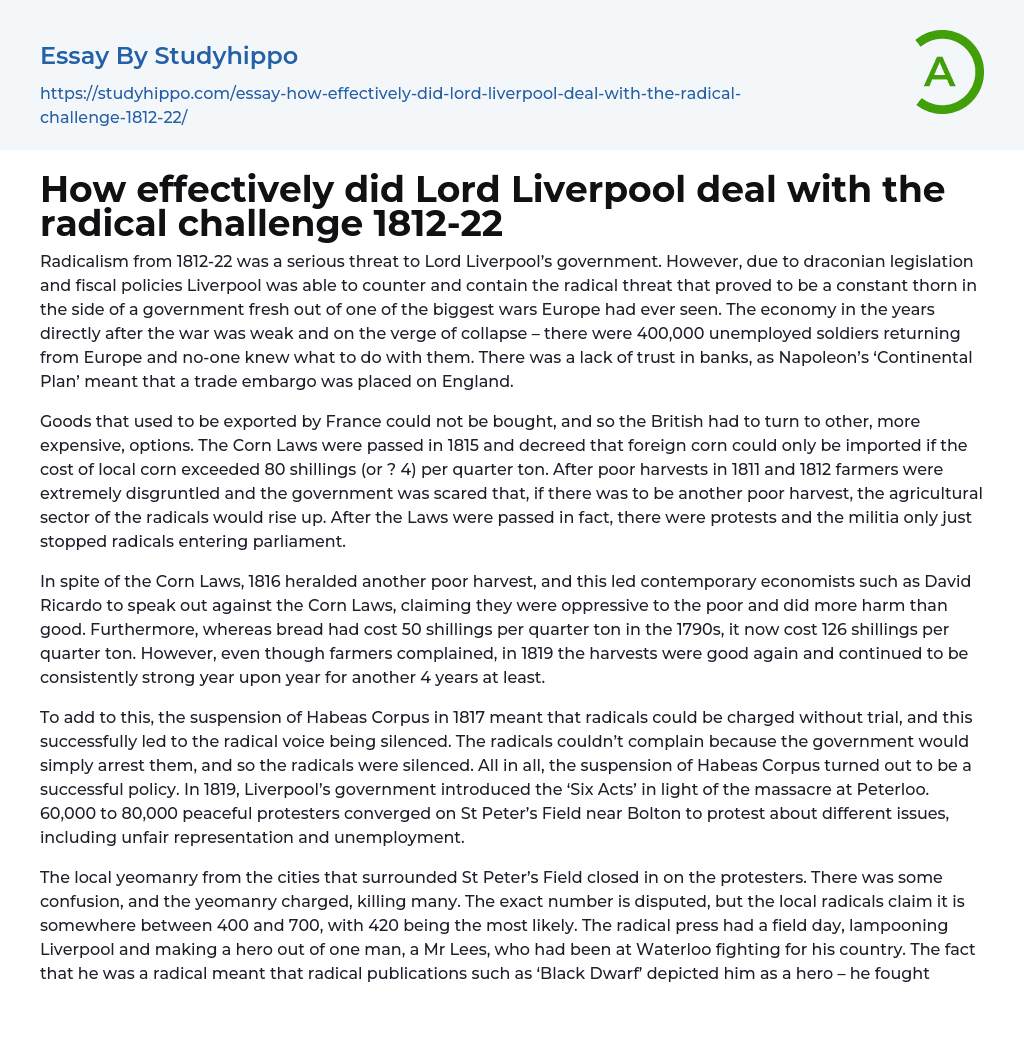

How effectively did Lord Liverpool deal with the radical challenge 1812-22 Essay Example
Radicalism from 1812-22 was a serious threat to Lord Liverpool’s government. However, due to draconian legislation and fiscal policies Liverpool was able to counter and contain the radical threat that proved to be a constant thorn in the side of a government fresh out of one of the biggest wars Europe had ever seen. The economy in the years directly after the war was weak and on the verge of collapse – there were 400,000 unemployed soldiers returning from Europe and no-one knew what to do with them. There was a lack of trust in banks, as Napoleon’s ‘Continental Plan’ meant that a trade embargo was placed on England.
Goods that used to be exported by France could not be bought, and so the British had to turn to other, more expensive, options. T
...he Corn Laws were passed in 1815 and decreed that foreign corn could only be imported if the cost of local corn exceeded 80 shillings (or ? 4) per quarter ton. After poor harvests in 1811 and 1812 farmers were extremely disgruntled and the government was scared that, if there was to be another poor harvest, the agricultural sector of the radicals would rise up. After the Laws were passed in fact, there were protests and the militia only just stopped radicals entering parliament.
In spite of the Corn Laws, 1816 heralded another poor harvest, and this led contemporary economists such as David Ricardo to speak out against the Corn Laws, claiming they were oppressive to the poor and did more harm than good. Furthermore, whereas bread had cost 50 shillings per quarter ton in the 1790s, it
now cost 126 shillings per quarter ton. However, even though farmers complained, in 1819 the harvests were good again and continued to be consistently strong year upon year for another 4 years at least.
To add to this, the suspension of Habeas Corpus in 1817 meant that radicals could be charged without trial, and this successfully led to the radical voice being silenced. The radicals couldn’t complain because the government would simply arrest them, and so the radicals were silenced. All in all, the suspension of Habeas Corpus turned out to be a successful policy. In 1819, Liverpool’s government introduced the ‘Six Acts’ in light of the massacre at Peterloo. 60,000 to 80,000 peaceful protesters converged on St Peter’s Field near Bolton to protest about different issues, including unfair representation and unemployment.
The local yeomanry from the cities that surrounded St Peter’s Field closed in on the protesters. There was some confusion, and the yeomanry charged, killing many. The exact number is disputed, but the local radicals claim it is somewhere between 400 and 700, with 420 being the most likely. The radical press had a field day, lampooning Liverpool and making a hero out of one man, a Mr Lees, who had been at Waterloo fighting for his country. The fact that he was a radical meant that radical publications such as ‘Black Dwarf’ depicted him as a hero – he fought for both England and reform.
The Six Acts were introduced in the wake of this in order to stop anything like the protest ever happening again. The ‘Seditious Meetings Act’ said that if you wanted to organise a meeting
with over fifty people you had to have the permission of a local magistrate. To add to this, the ‘Newspapers and Stamp Duty Act’ put harsh taxes on newspaper publication, meaning that the radicals who published newspapers such as ‘Black Dwarf’ could not afford to do it any longer. This was a successful policy, and Liverpool’s government was able to prove its effectiveness when the ‘Cato Street Conspirators’ were found guilty and executed.
They conspired to blow up Liverpool and his government, and were found out. Liverpool’s government were helped in part by the ‘Committee of Secrecy’, and idea that Liverpool borrowed from William Pitt. One of the conspirators was a member of the Committee, and he reported his findings back to parliament who promptly seized the conspirators. So, in conclusion, I think that Liverpool’s legislation was very effective, and even though the Corn Laws were not immediately worthwhile as such, with economists attacking the policy, in the long term it was effective and successful.
- Federal government essays
- Armed Forces essays
- Confederate States Of America essays
- Federal Government Of The United States essays
- Fourteenth Amendment To The United States Constitution essays
- Governance essays
- Parliament essays
- Politics essays
- Jurisdiction essays
- Bureaucracy essays
- Separation Of Powers essays
- Congress essays
- President essays
- United States Congress essays
- Non-Commissioned Officer essays
- Appeal essays
- Revenge essays
- Corporate Governance essays
- Public Service essays
- Income Tax essays
- Supply essays
- Red Cross essays
- Democracy essays
- State essays
- Liberty essays
- Absolutism essays
- Reform essays
- Republic essays
- John Marshall essays
- Bourgeoisie essays
- Developed Country essays
- Elections essays
- International Relations essays
- Left-Wing Politics essays
- Monarchy essays
- Political Corruption essays
- Political Party essays
- Political Science essays
- Sovereign State essays
- United Nations essays
- World Trade Organization essays
- Contras essays
- Dictatorship essays
- Foreign policy essays
- Monarch essays
- Corruption essays
- Foreign essays
- Democratic Party essays
- European Union essays
- President Of The United States essays



